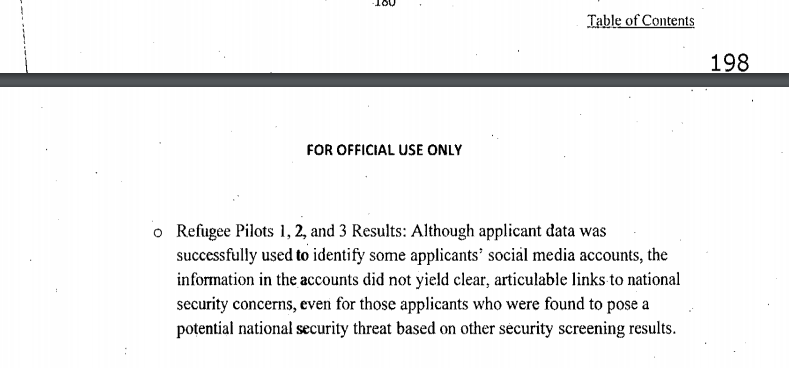
WASHINGTON — Federal officials are planning to collect social media information on all immigrants, including permanent residents and naturalized citizens, a move that has alarmed lawyers and privacy groups worried about how the information will be used.
The Department of Homeland Security (DHS) published the new rule in the Federal Register last week, saying it wants to include "social media handles, aliases, associated identifiable information, and search results" as part of people's immigration file. The new requirement takes effect Oct. 18.
Adam Schwartz, an attorney with the Electronic Frontier Foundation, which advocates for privacy and free expression, said the plan was disturbing.
"We see this as part of a larger process of high-tech surveillance of immigrants and more and more people being subjected to social media screening," Schwartz told BuzzFeed News. "There's a growing trend at the Department of Homeland Security to be snooping on the social media of immigrants and foreigners and we think it's an invasion of privacy and deters freedom of speech."
This would also affect all US citizens who communicate with immigrants, Schwartz said, who could self-censor out of fear that information they exchange with someone overseas could be misconstrued and used against them.
DHS said the amendment posted last week is not a new policy. It was added in an effort to be transparent, to comply with existing regulations, and due to updates in the electronic immigration system the agency said.
"DHS published this notice in the Federal Register on Sept. 18 to comply with the administrative requirements of the Privacy Act to help address these requirements, not launch a new policy initiative," the agency said. "DHS, in its law-enforcement and immigration-process capacity, has and continues to monitor publicly-available social media to protect the homeland."

Faiza Patel, codirector of the Brennan Center’s liberty and national security program, said this is yet another fad, started by the Obama administration, fueled by the belief that social media is going to help the US stop an attack in the country.
"It's very difficult to successfully use social media to determine what people are going or not going to do," Patel told BuzzFeed News. "When you look at all the different ways in which we use communication tools, and social media is pretty different, very truncated. People use emojis, they use short form, sometimes it’s difficult to know what something means."
In February the Office of Inspector General published a report that found DHS pilot programs for using social media to screen applicants for immigration benefits lacked criteria to determine if it’s effective.
Another concern, Patel said, is that the information would be used for ideological vetting by the US government who will be looking at people's political and personal views of people abroad and in the US.
"The question is do we really want the government monitoring political views?" Patel said. "Social media may not be able to predict violence but it can certainly tell you a lot about a person's political and religious views."

Alex Nowrasteh, an immigration policy analyst at the Cato Institute’s Center for Global Liberty and Prosperity, said the expansion seems to originate from concerns about Tashfeen Malik, one of the San Bernardino shooters in late 2015.
“This is another example of the government changing security protocols based on a previous incident that will impose an enormous cost and that is of dubious value for the future,” Nowrasteh said. “Social media has been used in immigration courts for years but there’s little evidence that it’s helped with visa vetting.”
The Trump administration has had an interest in how immigration authorities use social media despite there being no evidence to show it was reliable, according to USCIS presidential transition records.
“Yesterday at our briefing with the President-Elect’s Landing Team, one of the things they mentioned they’d be interested in seeing was guidance that we use regarding social media use and when/how we can use social media,” wrote a senior adviser in December.
In documents provided to the transition team, the agency said no immigration benefits had been denied solely or primarily because of information uncovered through social media vetting.
“In cases of benefit denial, the denial was based on information found outside of social media,” the document said.
Three refugee pilot programs to screen social media found that although they were able to find refugees accounts the information did not produce clear links to national security concerns even for applicants who were found to pose a national security threat.
A portion of briefing documents given to Trump’s transition team on USCIS’s use of social media to vet refugees.

César Cuauhtémoc García Hernández, assistant professor at the University of Denver Sturm College of Law, said DHS has a lot of discretion in how it treats information when making a decision on immigration benefits, even if its reliability is questionable.
"The fact that information gleaned from Facebook or Instagram or other social media networks might not be reliable doesn't mean that it will preclude DHS from using it as a basis for excluding people from the United States," García Hernández said.
Still, García Hernández said, it's important to remember that it's unusual for DHS to decide whether to allow someone into the US based on a single piece of information.
"Folks might share a post on social media that seems ripe for government officials to use as the hook for a conversation that starts to resemble an ideological purity test," García Hernández said.
There is also the possibility that someone may be hacked and will be held to task for a post or comment, García Hernández said.
"Having government oversight with the potential for life-changing adverse consequences when it comes to social media use by prospective immigrants is a pretty direct affront to the longstanding promotion of free speech that's at the core of the US constitution," García Hernández said.

